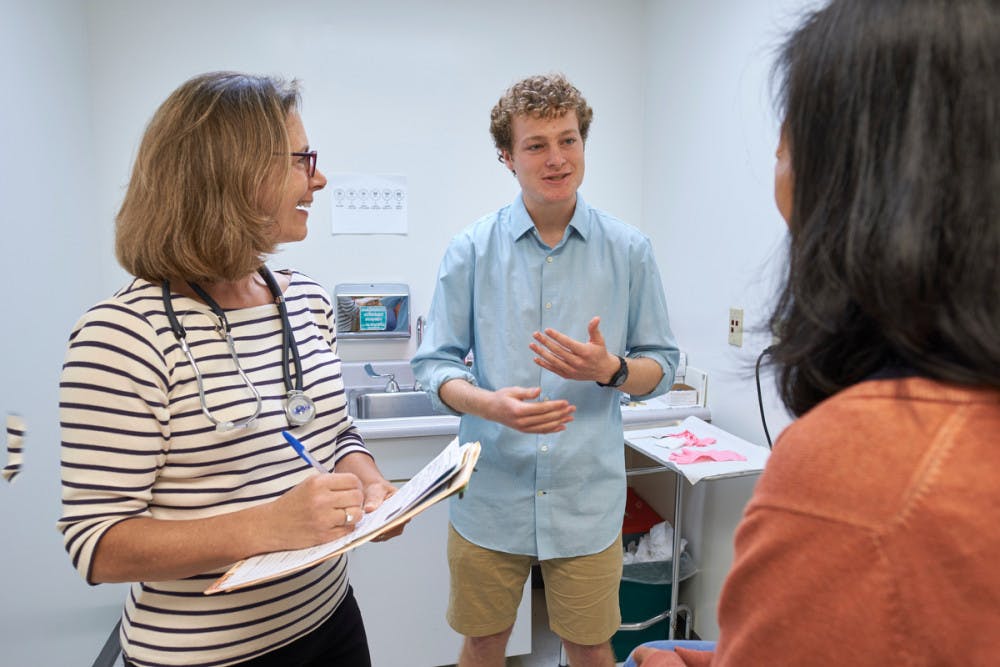Staff-members of the Open Door Clinic (ODC) arrived at the Axinn Center to train students to become future volunteers and interpreters on Saturday, Oct. 7. The ODC, according to its mission, “provides access to quality healthcare services, free of charge, to those who are uninsured or underinsured and who meet financial ability guidelines.”
Their services “are provided in a compassionate, respectful and culturally sensitive manner until a permanent healthcare provider can be established.” The ODC’s office is located in a trailer adjacent to the Porter Medical Center in Middlebury. Since its inception in 1993, the ODC has expanded its operations, offering seven clinics per month.
Open Door Clinic staffers Julia Doucet, Josh Lanney, and Christiane Kobuko, led the volunteer training session, which lasted from 9:30 a.m to 11:00 a.m. At the beginning, students were given folders containing extensive information about the ODC’s mission and operations and were required to complete a questionnaire.
Volunteer roles available for students included medical provider as an EMT, clinic reception, website design and technological assistance, administrative projects, J-term intern, Spanish and English translation and transcripts, and bilingual medical interpreter. A slideshow, presented by ODC staffers, gave an overview of the clinic’s funding and patient demographics, and provided a comprehensive background on the migrant workers who comprise 60 percent of the clinic’s patients. The presenters also highlighted barriers for migrant workers in receiving care.
Specialized training for medical interpreters lasted from 11 a.m to 4 p.m. The beginning of the session was spent disproving several myths about the reality of medical interpretation. For example, while family, friends, or any bilingual person can be thought of as sufficient at being a medical interpreter, several problems can arise, such as role reversal, editing, accuracy mistakes, guilt, omission and confidentiality.
Another myth included the idea that interpreters should interpret literally. What’s required, ultimately, is that the idea and context behind someone’s message is clearly conveyed. The students were also presented a formula to keep in mind: “Bilingual proficiency in medical terminology + a complex set of interpreting skills + the skilled use of ethical principles = qualified medical interpreter.” The rest of the training session focused on role-playing, where methods of interpretation were tested on the spot.
“Our office and Middlebury College work closely with the Open Door Clinic, and I would say we really appreciate the learning opportunities for students, and how students can make a positive impact for our local community,” said Ashley Laux, associate director of the Center for Community Engagement, when asked to describe the relationship between the college and the ODC.
“For at least five years, we’ve been offering trainings on campus, sometimes for general volunteer positions, and sometimes more specifically for medical interpreter positions,” Laux said. “It’s a rare opportunity to be in a really intimate client-doctor setting, and so that’s why quite a bit of training goes into it.”
“Students have been serving as paid summer interns [at the Open Door Clinic] since the summer of 2013, and that’s through Addison County privilege and poverty internship program,” Laux said. “Middlebury College pays their salary, but they work full-time for the full summer at the Open Door Clinic, which is a wonderful opportunity for them to immerse themselves in the work that the Open Door Clinic does.”
“Our relationship with the Center for Community Engagement is very important,” said Josh Lanney, patient services coordinator at the Open Door Clinic. “They provide us with an intern every year, which is invaluable help to us when none of the volunteers are around.”
“[Volunteerism] requires professionalism, reliability and then, more than a lot of other things, cultural competency, which is kind of an abstract term which refers to treating everybody like people,” Lanney said, when asked about the qualities the ODC looks for in volunteers.
“As far as student volunteers go, and who we’re looking for, the Open Door Clinic provides excellent mentoring opportunities to the students who volunteer with us. They are given a lot more roles and responsibilities than if they were to volunteer for any other organization,” Lanney said.
“I believe that the service through the Open Door Clinic helps students meet community-based needs,” Laux said. “The second half of the CCE’s mission is to strengthen communities, and so helping the Open Door clinic fulfill their mission is strengthening the local communities.”



